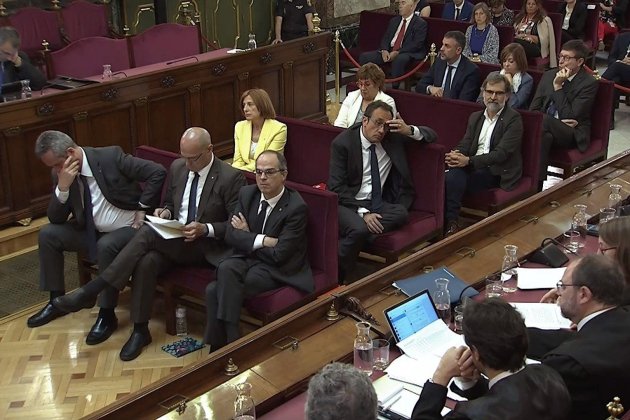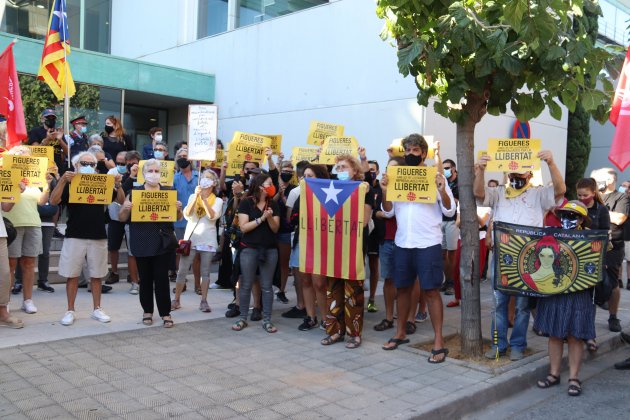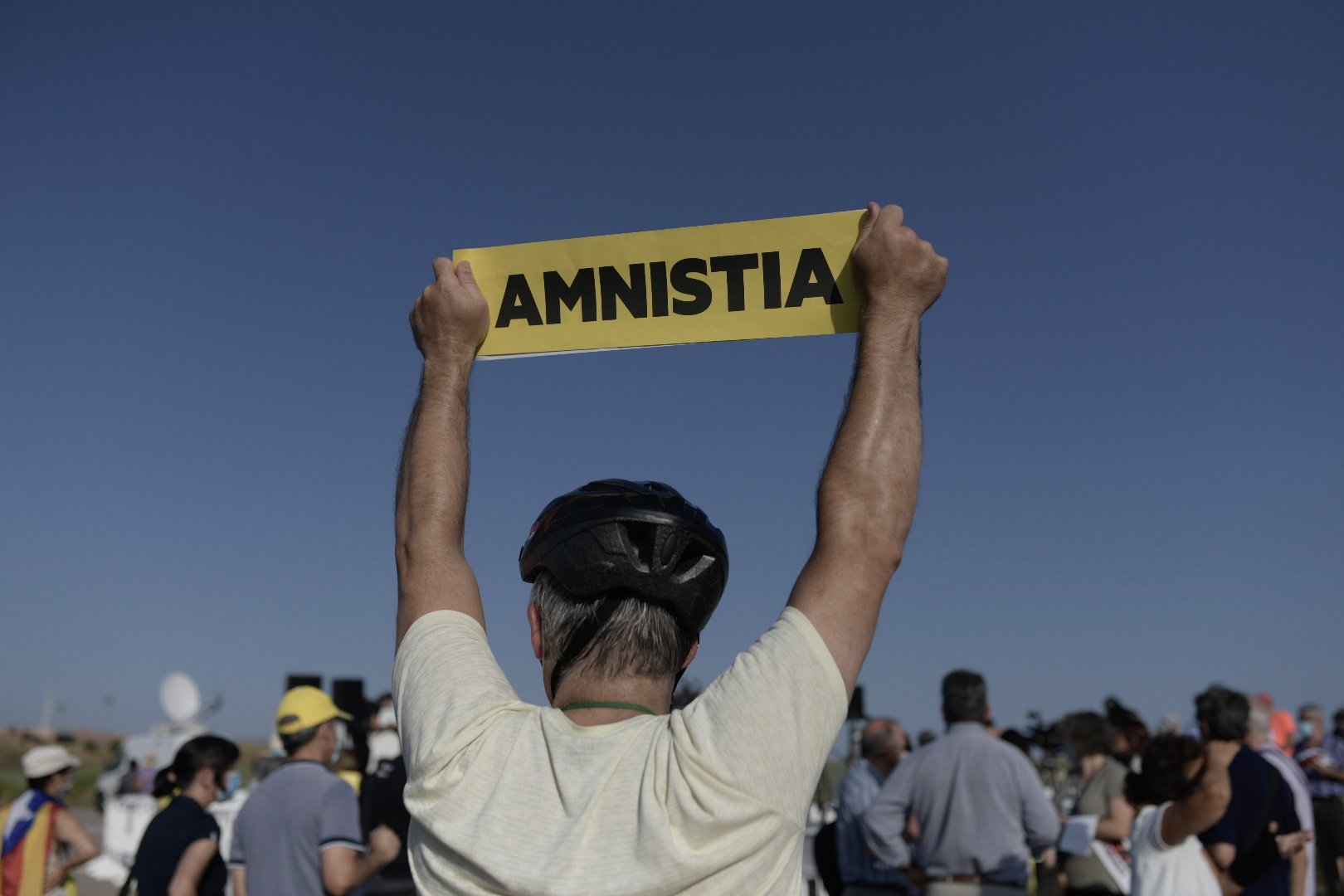Calls for the Spanish state to initiate an amnesty that would end the repression against people at all levels in the Catalan independence process, as a necessary step to resolving the conflict, have been constantly voiced since 2017. Now, the three pro-independence parties in the Catalan Parliament, JxCat, ERC and the CUP, have registered a proposal for a resolution which, if passed, calls on the Spanish Congress on behalf of the Catalan chamber to pass an amnesty law to resolve the situation of the thousands facing legal actions and investigations by Spanish authorities.
With the Spanish government showing great reluctance in its approach to even much more modest proposals, such as the reform of the sedition law, or possible pardons for the nine jailed pro-independence leaders, the proposal for Spanish parliamentarians to consider a broad amnesty law is ambitious to say the least. Nevertheless, the draft proposal registered in the Catalan Parliament sets out the broad lines for such a law, and the three Catalan parties say their intention would be to present it as a draft bill to Spain's Congress of Deputies after the Catalan elections on 14th February, specifically in March.
The proposal calls for the passing of a law that would not require anyone to renounce any of "the breached rights, including the right to self-determination" and which would state that the exercising of these rights does not "entail any criminal and administrative liability". Thus, the text would provide for the dropping of legal proceedings in relation to all alleged offences "linked to the democratic struggle for self-determination of Catalonia since January 1st, 2013."
The proposal asserts the need for the amnesty, asserting that "the free exercise of political rights cannot be responded to by the method of criminal justice." “Freedom of expression, of assembly and demonstration, of political participation through the election of representatives or through a the direct expression of a decision constitute basic and essential mechanisms of a democracy,” it adds.
List of offences included
While the text states that all actions connected to the independence process should be included in the law, it also spells out specific offences and crimes that the hypothetical amnesty would have to cover.
Obviously, the first crimes mentioned are those of rebellion and sedition, for which ministers of the Catalan government, the speaker of Parliament and the leaders of Òmnium Cultural and the ANC were brought to trial in the 2019 Supreme Court case, and sentenced to 9-13 years in prison. Misuse of public funds, for which some of those leaders were also convicted, could also be included "when linked to the crime of sedition."

Nine of the twelve prisoners were convicted of sedition, and five of those nine, for misuse of funds / Photo: Efe
The text also states that the amnesty would need to excuse offences of "abuse of office, forgery, misuse of public funds, disobedience or disclosure of secrets, as well as crimes committed on the occasion of or motivated by these" if they were linked to the "preparation, organization, promotion and execution of the participatory process to decide the political future of Catalonia on November 9th, 2014 or the referendum of October 1st, 2017 ", it continues.
The proposal also seeks to include expressions made in the media, the press and social networks "that have been assessed as hate crimes linked to the political conflict with Catalonia." With reference to events that have occurred in street protests, the three groups also call for the annulment of crimes against public order, "understanding as such any of the crimes of Title XXII of Book II of the Penal Code, committed in the framework of the democratic struggle for the self-determination of Catalonia and/or of the protests and actions of criticism of the action of the governmental and/or jurisdictional authorities to the political conflict with Catalonia, including those of the Constitutional Court, after the Referendum of 1st October 2017".
Nearly 3,000 people face retaliation
What is sought with this initiative, then, is to resolve in a single legal move, not only the situation of the political prisoners and exiles - who are mostly political and civil leaders - but of all those pursued by the state who for one reason or another have a link with the pro-independence process. There are almost 3,000 people in this category. "The amnesty must repair the damage caused to the retaliated people, their families and the groups of which they are part, and must provide for measures in relation to all those responsible for the repression of fundamental rights," says the text with regard to this aspect.

Protests in front of the courts have become a common trend since 2017 / Photo: ACN
At the same time, the political parties JxCat, ERC and the CUP add that this amnesty law must be accompanied by "an effective solution to the political conflict with the Spanish state that includes the recognition of the right to self-determination of Catalonia."
Call for mobilization
The final section of the text presented to the Catalan Parliament calls on Catalan society "to mobilize and support an amnesty that will allow the release of political prisoners, the return of exiles and the end of all cases opened for these reasons, and encourages all civic, political and social actors to support this proposal by means of a national agreement for amnesty, self-determination and civil and political rights."
Like chalk and cheese?
Most likely, the reactions to this proposal in the Catalan Parliament and the Spanish Chamber will be as different as chalk and cheese. In the Catalan chamber, it is likely to be passed by an absolute majority, with possible support from even the Comuns, while in the Congress this initiative would, in all probability, only obtain the votes of the pro-independence parties, groups from Spain's peripheral nations and, perhaps, support from Unidas Podemos. In no case could the governing PSOE be imagined lending its support for the plan, after reiterating that it does not support this option, which, in Socialist eyes, would mean that the state would be apologizing to the Catalan independence movement.

